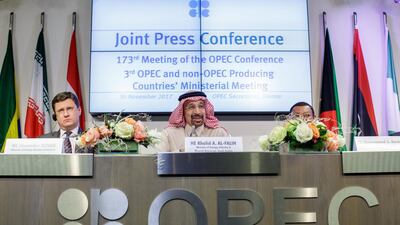Hedge funds are giving Saudi Arabia and Russia a big vote of confidence.
As the two oil powerhouses pushed for the extension of supply curbs ahead of Thursday’s Opec meeting, money managers shifted their stance on West Texas Intermediate crude to the most bullish since February. That’s largely due to a strong decline in short-selling. Bets on rising Brent crude also increased as short positions slumped.
“There was definitely a consensus that we were going to see a six- to nine-month extension, so to be short in front of that obviously would not be a good positioning for hedge funds,” said Nick Holmes, an analyst at Tortoise Capital Advisors, which manages US$16 billion in energy-related assets. “There was definitely some bullishness that we were going to see a pretty good result out of Opec, which we did.”
Opec and partners including Russia agreed on Thursday in Vienna to continue with their output cutbacks until the end of next year. Russia’s Energy Minister Alexander Novak said after the meeting that the deal was extended to show “long-term commitment” and it provides the opportunity for changes next year if needed.
____________
Read more:
Gulf states can lead the way with carbon capture
US shale uptick to bite into Opec-led market recovery
____________
Hedge funds raised their WTI net-long position - the difference between bets on a price increase and wagers on a drop - by 15 per cent to 396,484 futures and options in the week ended November 28, according to data from the US Commodity Futures Trading Commission. Shorts dropped by 39 per cent, while longs advanced 6.5 per cent.
The Brent net-long position rose by 2.2 per cent to 537,979 contracts, according to data from ICE Futures Europe. Longs increased by 1.1 per cent, while shorts declined 9.1 per cent to the lowest level since February.
In the fuel market, money managers reduced their net-long position on benchmark US gasoline by 3.1 per cent. Meanwhile, the net-bullish position on diesel climbed 3.2 per cent to a fresh record.
WTI and Brent are trading near two-year highs after surging more than 20 per cent over the past three months as Saudi Arabia and Russia gradually built momentum for their decision to prolong supply cuts. At the same time, stockpiles in the US have dropped significantly from their March peak.
That surge in prices could prompt hedge funds to take advantage of high prices to profit from selling, according to Mark Watkins, a Park City, Utah-based regional investment manager at US Bank Wealth Management, which oversees $142bn in assets.
“But longer-term, the re-balancing trade is starting to work, so if they are in it for that longer-term play, keeping a long position would make sense,” Watkins said in a phone interview.
The question mark is the US shale response. UBS Group warned that any further rise in oil prices would likely ignite US shale output, while Barclays said that Opec’s extension might boost nationwide production by another 1 million barrels a day by the end of next year. Yet Goldman Sachs Group Inc. said the duration of Opec’s cuts helps to lessen the risk of a large increase in production from high available spare capacity.
Going forward, if “inventories are dropping down and you’re not seeing a huge supply-side response from shale producers, then I think we’re going to increase open interest on the longs,” said Bart Melek, head of global commodity strategy at TD Securities in Toronto.

